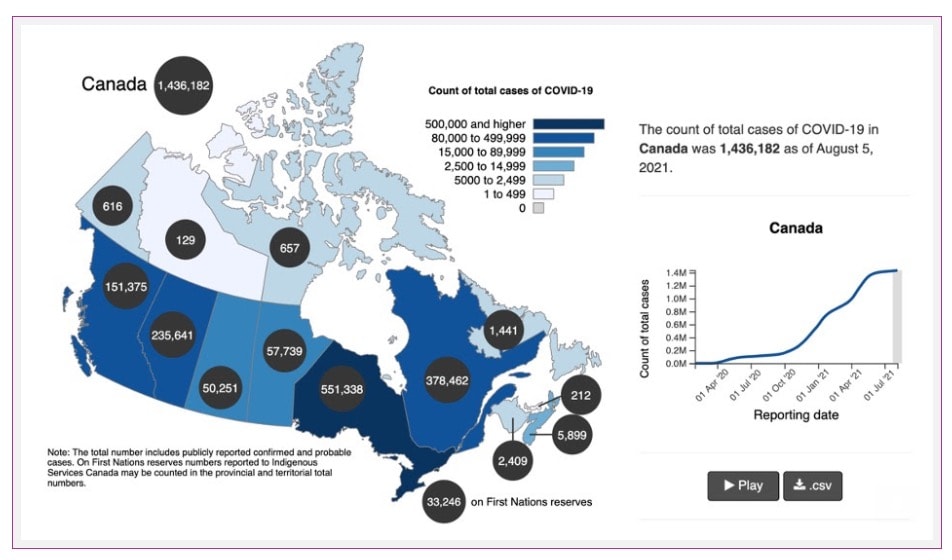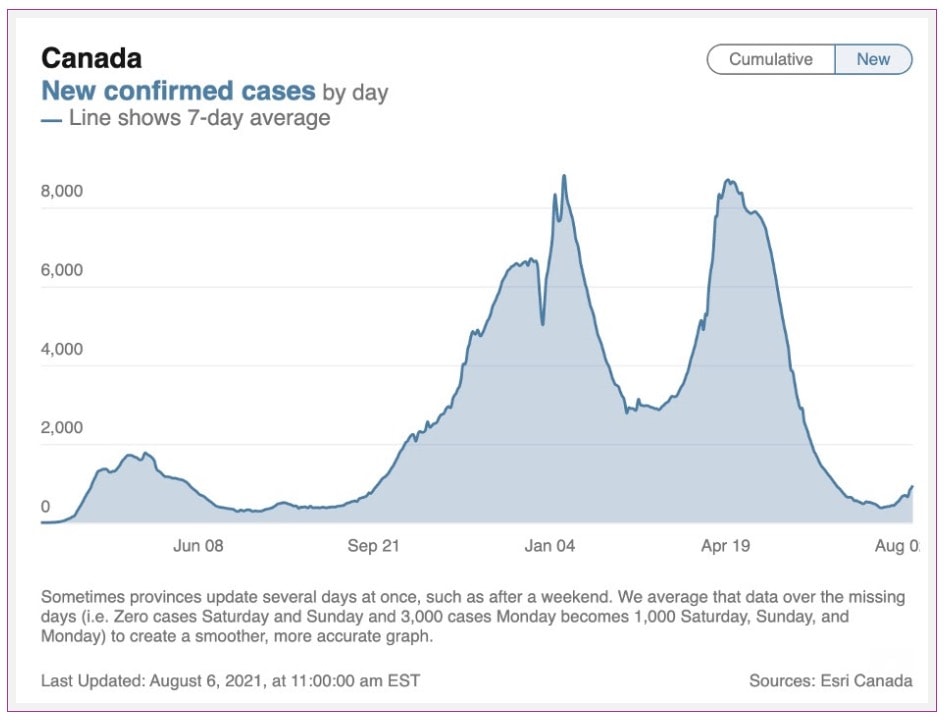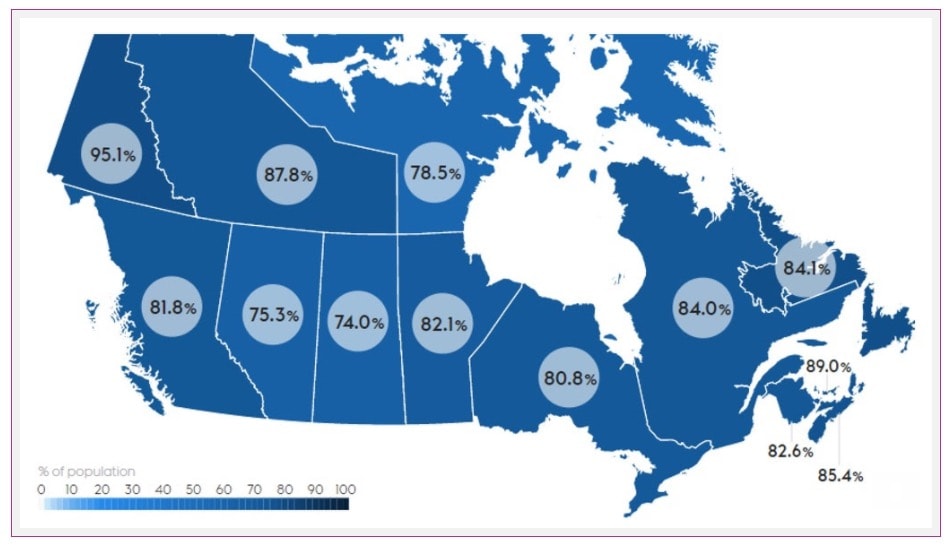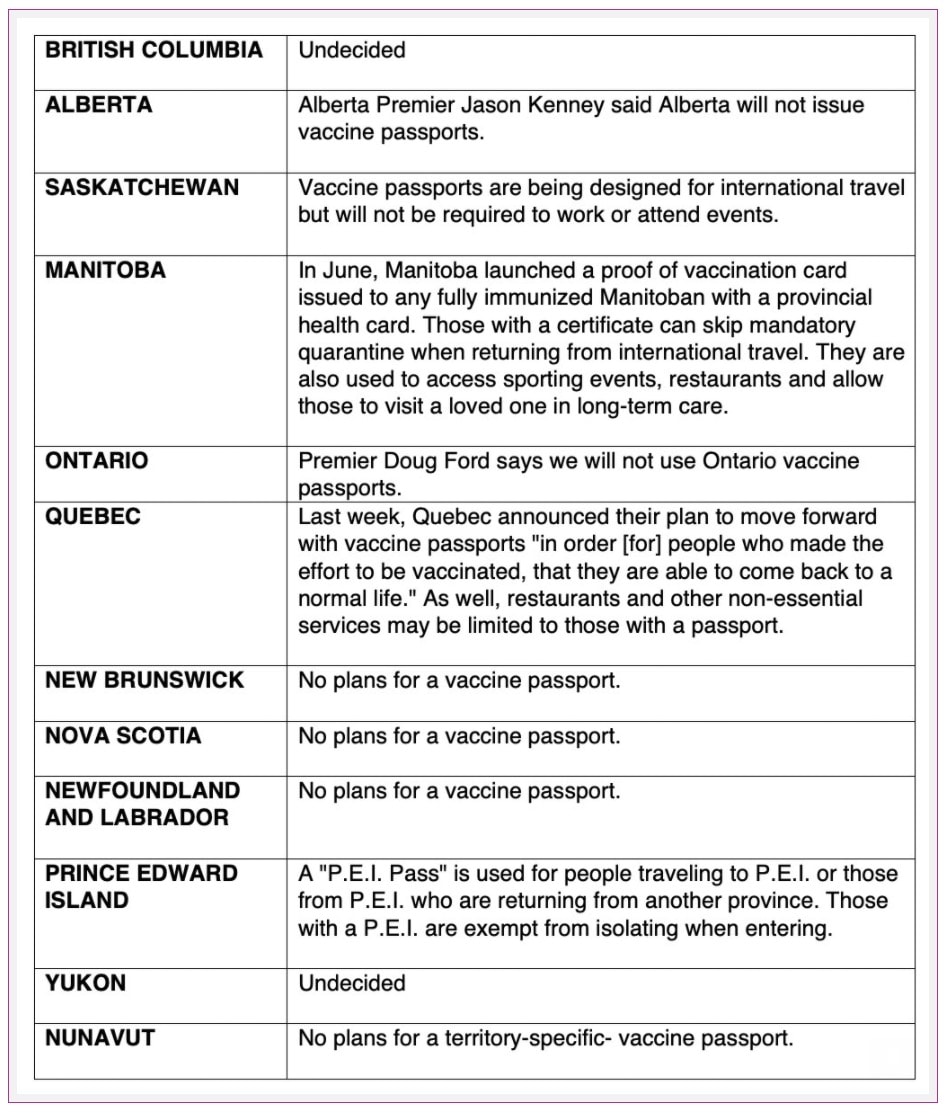Let’s talk about Ontario’s COVID-19 Back To School Plan
Hello friends!
I hope you had a lovely weekend and got to spend some much-needed R and R outside in the sun.
Let’s review the bad news, followed by the good news. Then, I will answer your most common questions of the week, followed by my weekly silver lining.
What’s the bad news?
Over 200 million cases of COVID-19 have been reported worldwide, with more than 4.2 million reported deaths.
There have been 1.4 million cases in Canada, with over 26,600 deaths.


What is the good news?
Over 4,359,746,000 COVID-19 vaccine doses have been given worldwide, representing almost 30% receiving their first dose and 15.2% receiving both.
In Canada, 81.1% of eligible (12+) people have received at least one dose, and 69% are fully vaccinated.

As the Delta strain spreads and many are worried about a fourth wave, provincial and federal governments are considering how to identify vaccinated and unvaccinated Canadians.
Prime Minister Trudeau said that federal vaccine passports for international travel “are active and ongoing” with no specific timeline.

In other good news, half of eligible Americans are now fully vaccinated, as they urge people to get the vaccine. In addition, the seven-day average of newly vaccinated people is up 11% from last week and 44% from the previous two weeks.
(The bad news is that the U.S. has seen almost 100,000 news cases a day due to the spread of Delta, a level not seen since February 2021. Deaths have climbed 75% in the past two weeks, from 244 to 426 a day. Over 615,000 Americans have died from COVID-19. The majority of hospitalized COVID-19 patients are unvaccinated.)
Will COVID-19 vaccines become mandatory?
A new study by Nanos Research, commissioned by CTV news, shows that 53% of Canadians agree with mandatory vaccinations for eligible Canadians. In addition, 21% somewhat supported mandatory immunization, 16% were opposed to it, 8% were somewhat opposed to it, and 2% were unsure.
People from Ontario and Quebec were more likely to favor mandatory vaccination than those in British Columbia and out East.
The Canadian Medical Association (C.M.A.) and the Canadian Nurses Association (CAN) are also in favor of mandatory vaccinations for health care workers as an “additional measure to protect patients, the health workforce, and health-care system capacity.” The groups are concerned about rising cases of Delta strain and plateaus in vaccine uptake. They are also pushing for governments to lower barriers to vaccine access.
Last week the World Health Organization appealed to countries to avoid administering boosters to people already vaccinated until more people can get the vaccine worldwide. Despite this plea, Germany, France, and Israel are going ahead with boosters.
What is the current back-to-school plan?
The Ontario government announced its back-to-school plan last week.
Here is a summary:
Cohorts
- Face masks will be required indoors for kids in grades 1-12, except for eating and during low-contact physical education classes.
- Students in kindergarten will be encouraged to wear a mask, but it won’t be required.
- Kindergarten-grade 8 students will be cohorted for the whole day and, when possible, with one teacher.
- Cohorts can mix outside with some distance. For example, cohorts can mix in filled buses and at assemblies.
Ventilation
- Schools with mechanical ventilation should use the highest-grade filters.
- Systems should be on at least two hours before school starts.
- Schools without mechanical ventilation should have standalone HEPA (high-efficiency particulate air) units in all classrooms.
Cleaning
- Disinfection of high-touch surfaces is suggested at least twice a day, including washrooms, doorknobs, eating areas, light switches, handles, and desks.
Vaccinations
- COVID-19 vaccines will not be mandatory for anyone.
- Eligible people are encouraged to get vaccinated.
What are some risks?
A few contentious issues:
- Indoors, students can sing and play wind instruments, as long as there is ‘adequate ventilation.’
- Assemblies can restart, as well as field and overnight trips.
- School buses can be filled with a mixture of cohorts.
What do we know about long-lasting COVID symptoms in kids?
We received some great news last week regarding long-haul COVID in kids. A large study in the United Kingdom of more than 250,000 children between September 2020 and February 2021 found that long-lasting symptoms from COVID in kids is rare, and most kids recover from COVID-19 within a week of being infected.
The study demonstrated that only 4.4% of kids experience symptoms after four weeks, and fewer than 2% have persistent symptoms after eight weeks.
Data was collected by parents using a smartphone app and is the first detailed analysis of COVID-19 infection in symptomatic, school-aged kids.
The study provides some reassurance that long-term symptoms in children are rare. According to the researchers;
“it is reassuring that the number of children experiencing long-lasting symptoms of COVID-19 symptoms is low. Nevertheless, a small number of children do experience long illness with COVID-19, and our study validates the experiences of these children and their families.”
In this sample, 1,734 children aged 5-17 tested positive;
The kids typically recovered within seven days and had an average of three symptoms. 98% of all symptomatic children recovered by eight weeks, confirming that the illness “tends to manifest as a mild illness in children and that they usually recover quickly.”
84% of the kids experienced an average of 2 persistent symptoms after four weeks. The most common symptom was fatigue. Other common symptoms were headache and loss of smell. Headaches tended to occur early, and loss of smell later on.
Older kids were sick with COVID for longer than younger kids, though only seven days versus five days.
They also found that kids with COVID-19 were sick longer than kids with other illnesses (and negative for COVID-19). These children were age-matched and gender-matched children with symptoms who tested negative for COVID.
Are animals getting vaccinated too?
Did you hear the Kansas City Zoo will be vaccinating their species that are most at risk of COVID-19 infection? The chimpanzees, orangutans, gorillas, lions, tigers, cheetahs, and leopards will receive vaccines soon. It isn’t the same vaccine as humans receive, though, and is specifically designed for animals and won’t affect the human vaccine supply.
My silver lining of the week
I have been so happy to chat with tons of patients in the last few weeks who are thrilled to be back with peers in camp, at the playground, and in their backyards. The joy kids exude when playing with their friends (even masked or distant) is palpable. I am thrilled, so many kids are getting a chance to feel a bit more normal, especially in the sunny and warm weather. I hope the rest of the summer feels this nice.
Have a fabulous week, friends,



![[Dr. Dina News] IMPORTANT UPDATE re. VIRTUAL CARE](https://drdina.ca/wp-content/uploads/2021/01/dr-dina-kulik-kids-and-virtual-care-1a-400x250.jpg)
![[Dr. Dina News] COVID-19 Vaccine for Infants and Young Children.](https://drdina.ca/wp-content/uploads/2021/04/dr-dina-kulik-kids-and-vaccines-400x250.jpg)
![[Dr. Dina News] COVID-19 Vaccine for Infants and Young Children.](https://drdina.ca/wp-content/uploads/2022/04/DRD-1-400x250.jpg)






